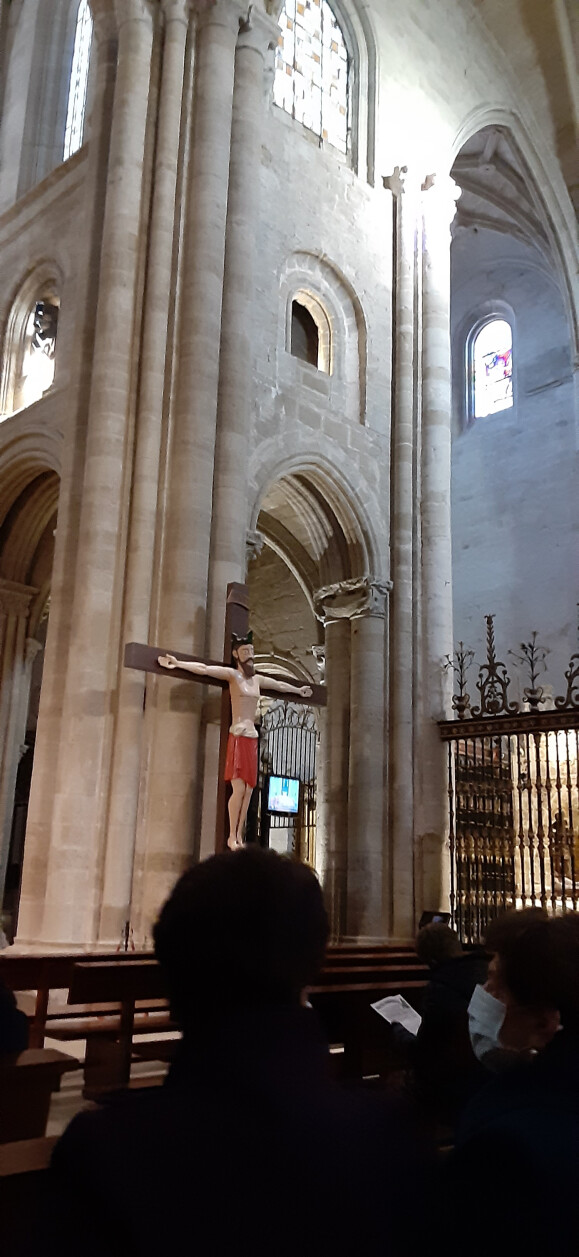On Camino II: In Holy Week
Daily life: You awaken at about 6 a.m., often in a room with many other pilgrims in bunks, some of whom snore, some of whom smell, some of whom are restless through the night, washing your face, repacking your things. You have to be out the door by 8. You get breakfast nearby: a coffee, a roll, a piece of fruit for the road. Then you walk. After a couple of hours, you enter a village. There is a “bar” open that offers a second coffee, maybe a chocolate pastry, a Spanish tortilla; you hear someone call it “second breakfast” and you both laugh that hobbits are as well known to Europeans as to you. You walk some more, taking off a layer or two, changing your stocking cap for a wide-brimmed one, putting on sunscreen. Another village, another bit of food. You never feel hungry, although you aren’t eating that much more than usual (probably less). There are fuentes (water fountains) in the center of many villages. You tend to your feet, changing socks midday, remembering how important they are (and, since it is the holy week, how Jesus washed them). At some point you know you are done. You find an albergue, a pilgrim hostel with a bed. You take a shower, wash underwear and socks, and after a rest have a proper meal.
But before the meal, you go to a pilgrim mass. They aren’t available in every stopping place. There are churches everywhere. Some of them are open for visitors to gawk and take photos and maybe kneel in prayer. Others are simply locked. But more often than not, there is a church with a mass at, say, 7:30 p.m., which is 19,30h as the locals reckon it.
I have been to several now. Always in Spanish, I can understand only a bit. For instance, when the priest reads the Gospel, I can pick up that this time it is from John. I listen for words that clue me in, and maybe I guess where in the gospel the reading is from.
I like these priests. They are very different, one from another. Some rush (which I do not like; it moves my comprehension from minimal down to zero). Some are earnest and convey that this is serious. Some are human in revealing ways; one had hardly a voice.
On the eve of Palm Sunday, a few of us peregrinos were at the 20,00h mass in Santo Domingo, in a rather full church. N. from Brooklyn, whose Spanish is much better than mine, said the priest welcomed and prayed for pilgrims both at the beginning and the end of the mass. There was also, I deduced, an urn near the altar; it seemed a man had recently died, and this service was the occasion for his ashes to be placed somewhere in the church (at the end, a layman carried the urn out in front of the priest). There was no blessing of the palms or other local greens, but the gospel had something to do with Jesus’ death (it was not the passion gospel, though).
At communion I went forward for a blessing, crossing my arms and saying “Peregrino, padre.” At the end, we were walking around, in awe of the architecture and the various altars, statues, and paintings tucked throughout this smallish cathedral, when someone told us to go to a particular side room where an assisting priest stamped our pilgrim “credential.” We looked some more, and found ourselves meeting the celebrant, returning, still in his red chasubule. S. from Germany said to him one word: chicken. The priest laughed all over. He said no one knows any word of English but then he will say “chicken.” He was jolly and welcoming. He led us through a crowd to a side and there, in a high up coop we had passed but not noticed, were a hen and a cock. “They are sleeping,” the priest said. But as we watched one of them started walking around.
A pilgrim can miss many things. I miss singing All glory laud and honor. I miss holding a palm. I miss my own bed. And so forth. But there is so much to enjoy! Who would ever have imagined: Palm Sunday eve, pilgrims, a committal of ashes, a church hundreds of years old, and a chicken? One cannot help but be thankful for these churches and these priests, for these centuries, for the chickens—and of course for the God who holds it all in his hands.


